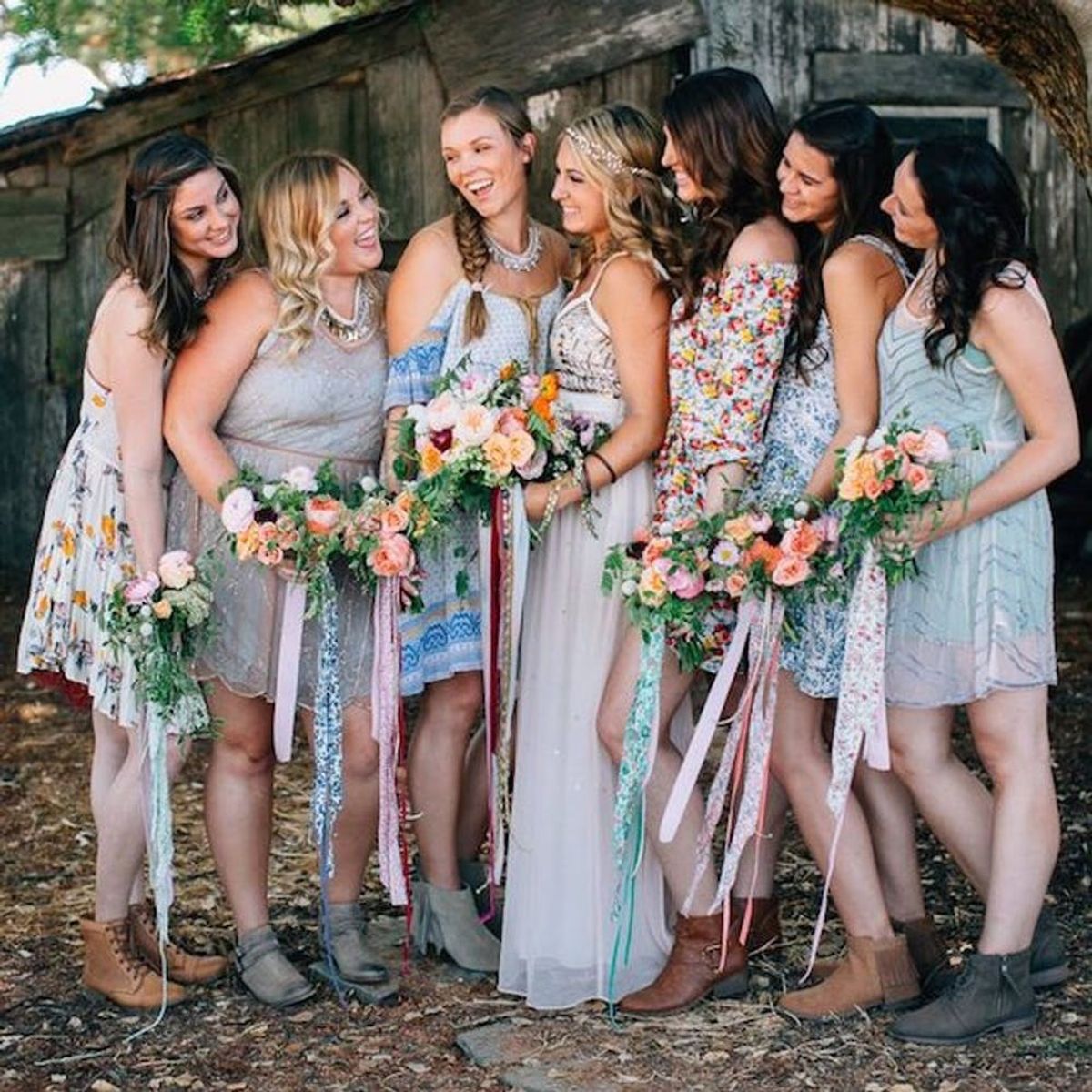10 Weddings That Prove Mismatched Bridesmaids Dresses Rule

The only rule when it comes to planning your wedding: anything goes. If there was ever a time to be 100 percent authentic, your Big Day is THE day. And this doesn’t just apply to the bride and groom. The hottest trend is mismatching bridesmaids dresses so each girl gets to wear a gown that’s flattering to her body type AND makes her feel fantastic. Your bridesmaids will be into the idea because they’ll have the opportunity to contribute an original spin to your special ceremony, plus they won’t have to drop a ton of money on a dress that they don’t love. Win-win!
1. Shabby Chic to the Max: Boho brides, take a good, hard look at this set of mismatched maids. They’ve all stuck to a grey-and-white theme, but added their own flair with patterns. The bride even let them wear flat booties, which means there wasn’t a sore foot in the house. (via Jen Rodriguez)
2. All That Glitters: This set of bridesmaids has a very vintage feel, resembling a scene straight out of The Great Gatsby. They also prove that mismatched dresses don’t have to be different in just color or pattern. They can also be embellished differently. Keep all the lengths long for added glam. (via Erich McVey)
3. Pastel Party: Spring weddings call for soft colors, and now you don’t have to pick just one. These bridesmaids look ethereal in floor-length shades of purple, pink, peach and teal. Make sure you give all of your girls matching bouquets to tie the look together like this bride did. (via Skyla Walton)
4. Make Me Blush: Give your maids a color and let them run with it? Why not? Looks like that’s what this bride did, and it turned out fabulous. Each girl ended up with a unique, flattering frock within the blush color family — three ladies have floor-length gowns, which could signify that they’re maids or matrons of honor. That’s a pretty fashionable way to give a shout-out. (via Jacquelyn Poussot)
5. Mix-and-Match Times Two: This bride appears to have given her maids two inspiration colors: mint and blush pink. Other than that, they had free reign to choose their own lengths, fabrics and shoes. The key was the one patterned dress that had both colors and, thus, tied ‘em all together. (via Jen Rodriguez)
6. First Lace: All of these bridesmaids have on the same gown, but there’s a mix of shades. Envision the line-up of your bridesmaids before letting them pick colors so that no two girls in the same hue are side-by-side. (via Jose Villa)
7. Bright-smaids: You don’t have to shy away from color on your big day, as proven by these gals in cheery shades of pink. We’ve seen it done in every color of the rainbow — just give your girls a color and let them choose a shade that suits their skin tones. With enough colors, you could even have your girls line up to create an ombré effect! (via Wendy Laurel)
8. White Is Alright: These cream-colored dresses prove that wearing white to a wedding is no longer a no-no. In fact, it’s the perfect hue for a beach or summer wedding, where you want everything breezy, bright and clean. You can also tone down the white of your maids’ dresses if you want your dress to shine brightest. (via SugarLove Weddings)
9. Thinking Pink (and Glam): These gals make their mismatched-ness look glam, thanks to the sweeping length of each gown. They also keep things looking meant-to-be-mismatched by sticking to similar fabrics and colors and by toting bouquets that do match. (via Steve Steinhardt)
10. Simple Shading: In our final example, let’s just reiterate just how easy it is to mismatch your maids. Choose a single dress and a few shades that match your theme. Then, assign each girl a color based on her spot in your bridesmaid line. Voila. Now you’re ready to walk down the aisle in style. (via Style Unveiled)
Gone are the days where you must have the matchy-matchy bridesmaid dresses. The trend is creativity, and you can let yours shine with a mismatched set of gowns that will make you, your maids and your wedding day sparkle.
Which mismatched trend do you like best for your wedding day?


















